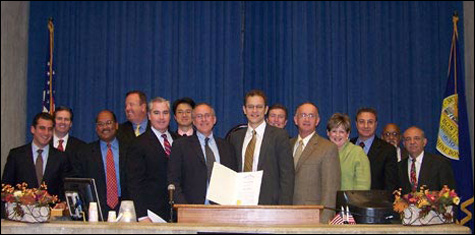
Boston City Council
Open government is fine — as long as it's for others
The BOSTON CITY COUNCIL came up with a novel solution to a vexing problem.
Having repeatedly been accused of violating the Massachusetts open-meeting law, the 13-member council last September took up a proposal to ask the state legislature for an exemption. Thus would the Council have become the only elected body in the state's 351 cities and towns to be relieved of the burden associated with conducting the public's business in public.
Councilor Michael Flaherty defended the proposal at the time, claiming that the law created a "chilling effect," adding, "You can't even have a conversation with colleagues in the hallway or in a session."
That's an interesting observation. The law says that a quorum — that is, a majority — of members cannot discuss official business outside the context of a legal, publicly announced meeting. So unless Flaherty was talking specifically about city affairs with at least six other councilors in his proverbial hallway, he was in no danger of violating the law.
Fortunately, the proposal went nowhere. And in January, on the eve of announcing his campaign for mayor, Flaherty said he would apologize for the Council's violations of the law from 2004 to 2006, when he was president.
"At the time, I thought I was acting appropriately," said Flaherty. "The courts decided things should have been handled differently. Lesson learned."
The open-meeting law is not perfect. (For one thing, the legislature, in its wisdom, exempted itself.) But the law functions as a rough guarantee of openness at the local level. It also allows for private deliberations when discussing such sensitive matters as contract negotiations and lawsuits.
If anything — as journalists, community activists, or public watchdogs who've spent time dealing with secretive municipal-government officials will tell you — the open-meeting law ought to be strengthened, especially with regard to punishing violators. Too many elected officials ignore the law, knowing they risk nothing more than a tongue-lashing from the district-attorney's office.
The law is a burden only to public officials who think the public is a burden.
...